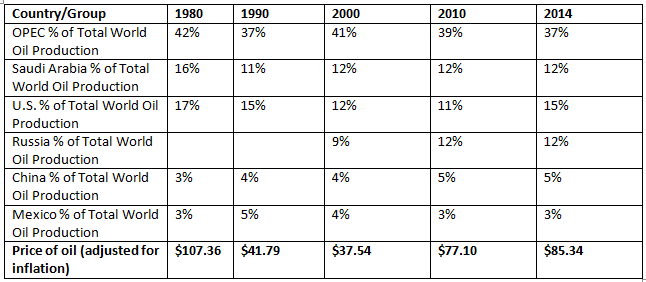Oil, China’s Innovations and the Most Popular Person in the World
You may hope that what happens in Vegas stays in Vegas, you may wish that Chris Rock puts Hollywood in its place on Sunday, you may leap to conclusions about what you’re going to do with an extra day in February, but rest assured that regardless of your hopes, wishes and leaps, we will provide answers on Saudi Arabia’s ability to control the price of oil, China’s role as a copy cat or innovator and who is the most popular person in the world. Yes, even if it means we end up in Gitmo just before closing time, it is this week’s International Need to Know, the road less taken to key global knowledge.
Without further ado, here’s what you need to know.
Greasing the Skids of Oil
Some worry that OPEC will try to increase oil prices by limiting supplies. Yesterday Saudi Arabia threw cold crude on the idea, claiming it is willing to let oil go down to $20 per barrel to drive other producers out of the market. Can Saudi Arabia control the market price? Is there a supply-side solution to low oil prices? Here’s a table of the largest oil producers’ share of worldwide oil production since 1980.

If I was betting, and if you’re in the stock market you’re already gambling on oil, I’d guess that OPEC and Saudi Arabia will find it difficult to drive up prices by freezing production, at least in the long term. Perhaps they can have a short term effect, but it will be short-lived, as more production will come on-line quickly. And, as we noted in this space previously, we are nearing peak oil consumption. The laws of supply and demand are not in Saudi Arabia’s favor in the medium-to-long run.
Yes, China Innovates
When I was in China recently I was reminded of the misperception that China only copies, it does not innovate (loyal readers know INTN’s distaste for perception over reality). During the trip, we saw amazing innovations in mobile apps, mobile phone technology and plant genetics, to name just a few. I ate millet that grows in extreme weather with less water, played with phones that had more features than a Tim Cook-FBI mashup and saw new ways to monetize social media services. AsConnie Chan notes, Chinese companies’ innovation is being rewarded: “last year, investors both in and out of China deployed $37 billion into Chinese startups (more than double 2014 and more than 8x of 2013).” Sure this may indicate a bubble but unlike, say, real estate bubbles, technology effervescences generally only happen in innovative places. North Korea would kill for a bubble. Come to think of it, they may just kill for kicks. Argentina would be delighted to have a technology bubble; it would mean they are home to lots of innovative companies. Technology bubbles are dangerous but they are also a sign you have a strong base of innovative technology companies. Count China as one of those with a strong base. China has many economic problems and challenges, but as Jay-Z says when commenting on the Chinese economy, innovation ain’t one of them. Next week we tackle why Chinese companies were forced to innovate.
Who is the Most Popular Person in the World?
With good reason it is neither you nor me But now you can explore the rankings of the most globally known athletes, artists, mathematicians, business people and other “cultural producers.” It’s all courtesy of the good folks at MIT. The number one most globally known human in the world according to MIT? That old philosophical rascal Aristotle. Even as we quibble with their methodology, in the meantime pour yourself a Belgian beer, Chilean wine or Seattle organic, fair trade coffee and delve into the rankings. Here’s a teaser: the 10 most globally known musicians since 4000 BC*:
1. Jimi Hendrix
2. Bob Marley
3. Bob Dylan
4. John Lennon
5. Louis Armstrong
6. Paul McCartney
7. Niccolo Paganini
8. Franz Liszt
9. Eric Clapton
10. Ray Charles
*There’s a lyre player from ancient Mesopotamia whose gotta big beef with this list.


Leave a Reply
Want to join the discussion?Feel free to contribute!